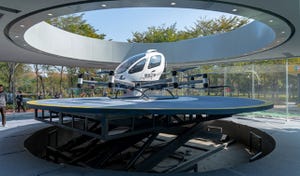Ride Sharing Service Adds More Self-Driving VehiclesRide Sharing Service Adds More Self-Driving Vehicles
Lyft starting collaborations with Israel’s Mobileye, Michigan-based May Mobility, New York-based Nexar

Ride sharing service Lyft is set to offer more autonomous vehicles (AV) in the future having announced several new partnerships.
Three collaborations have been confirmed: one with Israel’s Mobileye, one with Michigan-based May Mobility and one with New York dash cam firm Nexar.
In the arrangement with Mobileye, Lyft plans to make its platform available to certain vehicles fitted with the company’s self-driving technology.
AVs fitted with Mobileye Drive, an end-to-end self-driving system that delivers full autonomy, would gain access, allowing both small and large fleet operators to engage with the Lyft network of riders.
Companies Mobileye said are integrating Mobileye Drive into their AV solutions include the Volkswagen Group, the recently launched Verne (a new brand from Croatian hypercar manufacturer Rimac) and Holon, which has confirmed plans to open a $100 million plant to produce autonomous EV shuttles in Florida in 2026.
In the deal with May Mobility, the familiar autonomous Toyota Sienna minivans would become available on the platform in Atlanta in 2025. May Mobility has launched a number of new services across the United States over the past couple of years, and the tie-up with Lyft marks the start of what the pair expects will be a series of deployments across multiple markets in the future.
The link-up with Nexar is focused on pairing the dashcam developer’s hundreds of millions of hours of video footage with Lyft data to provide automakers and AV companies with a more complete data set for autonomous research and development.
David Risher, CEO of Lyft, said: “Lyft’s aim is to connect AVs, drivers, riders and partners to create new opportunities for all. Our rideshare network will continue to evolve as millions of people will have the opportunity to earn billions of dollars whether they choose to drive, put their AVs into service, or both.”
Lyft previously offered autonomous vehicles on its network via the now defunct Argo AI in Austin and Motional in Las Vegas, although they were never fully driverless.
The new deals follow a series of AV tie-ups confirmed by ride-sharing rival Uber.
The market leader plans to
An agreement was also reached with the U.K.-based Wayve to develop its AI solutions for vehicles.
About the Author
You May Also Like


.png?width=700&auto=webp&quality=80&disable=upscale)





